
The First Air Force is a numbered air force of the United States Air Force Air Combat Command (ACC). It is headquartered at Tyndall Air Force Base, Florida. Its primary mission is the air defense of the Contiguous United States (CONUS), United States Virgin Islands and Puerto Rico.

The Tenth Air Force is a unit of the U.S. Air Force, specifically a numbered air force of the Air Force Reserve Command (AFRC). 10 AF is headquartered at Naval Air Station Fort Worth Joint Reserve Base/Carswell Field, Texas.
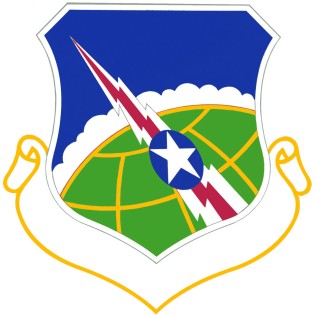
The 23rd Air Division is an inactive United States Air Force intermediate echelon command and control organization. It was last assigned to First Air Force, Tactical Air Command (ADTAC). It was inactivated on 1 July 1987 at Tyndall Air Force Base, Florida.

The 29th Air Division is an inactive United States Air Force organization. Its last assignment was with Air Defense Command, being stationed at Duluth International Airport, Minnesota. It was inactivated on 15 November 1969.
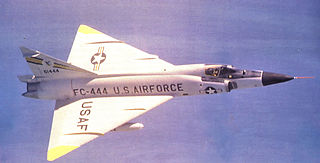
The 30th Air Division is an inactive United States Air Force organization. Its last assignment was with Air Defense Command, assigned to Tenth Air Force, being stationed at Sioux City Municipal Airport, Iowa. It was inactivated on 18 September 1968.

The 31st Air Division is an inactive United States Air Force organization. Its last assignment was with Air Defense Command, assigned to Tenth Air Force, being stationed at Sioux City Municipal Airport, Iowa. It was inactivated on 31 December 1969.

The 33rd Air Division is an inactive United States Air Force organization. Its last assignment was with Air Defense Command, assigned to First Air Force, being stationed at Fort Lee Air Force Station, Virginia. It was inactivated on 19 November 1969.

The 34th Air Division is an inactive United States Air Force organization. Its last assignment was with Air Defense Command at Custer Air Force Station, Michigan. It was inactivated on 31 December 1969.

The 35th Air Division is an inactive United States Air Force organization. Its last assignment was with Air Defense Command, assigned to First Air Force, at Hancock Field, New York. It was inactivated on 19 November 1969.

The 101st Air Refueling Wing is a unit of the Maine Air National Guard, stationed at Bangor Air National Guard Base, Bangor, Maine. If activated to federal service with the United States Air Force, the 101 ARW is operationally-gained by the Air Mobility Command (AMC).

The 103d Airlift Wing is a unit of the Connecticut Air National Guard, stationed at Bradley Air National Guard Base at Bradley International Airport, Windsor Locks, Connecticut. If activated to federal service with the United States Air Force, the 103 AW is operationally-gained by the Air Mobility Command (AMC).

The Western Air Defense Force (WADF) is an inactive United States Air Force organization. Its last assignment was with Air Defense Command being stationed at Hamilton Air Force Base, California. It was inactivated on July 1, 1960.

The Eastern Air Defense Force (EADF) is an inactive United States Air Force organization. Its last assignment was with Air Defense Command being stationed at Stewart Air Force Base, New York. It was inactivated on July 1, 1960.

The 46th Fighter Training Squadron is an inactive United States Air Force unit. Its last assignment was with the 917th Operations Group stationed at Barksdale Air Force Base, Louisiana. It was inactivated on 1 October 1993.

The 83d Fighter Weapons Squadron is a United States Air Force unit, assigned to the 53rd Weapons Evaluation Group. It is stationed at Tyndall AFB, Florida.
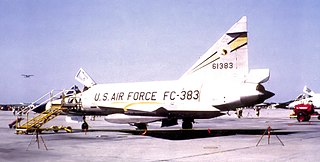
The 326th Fighter-Interceptor Squadron is an inactive United States Air Force unit. Its last assignment was with the 328th Fighter Wing at Richards-Gebaur Air Force Base, Missouri, where it was inactivated on 2 January 1967.

The San Francisco Air Defense Sector (SFADS) is an inactive United States Air Force organization. Its last assignment was with the 28th Air Division, being stationed at Beale Air Force Base, California.
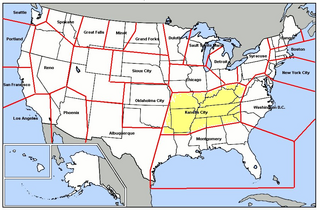
The Kansas City Air Defense Sector (KCADS) is an inactive United States Air Force organization. Its last assignment was with the Air Defense Command 29th Air Division, being stationed at Richards-Gebaur Air Force Base, Missouri. It was inactivated on 1 January 1962.
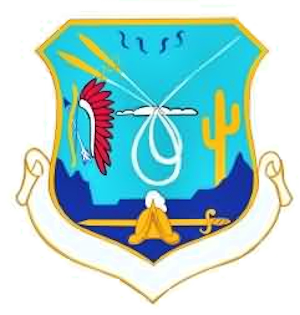
The Albuquerque Air Defense Sector (AADS) is an inactive United States Air Force organization. It was briefly active between 1 January and 1 November 1960, assigned to the 33d Air Division at Kirtland Air Force Base, New Mexico. The sector was responsible for the air defense of New Mexico and most of Texas, and was inactivated as a result of a shift towards ballistic missile defense.
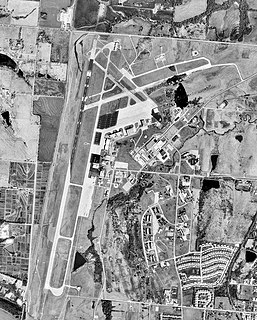
Richards-Gebaur Memorial Airport is a former airport that operated alongside Richards-Gebaur Air Reserve Station until the base's closure in 1994, and until it was closed in 1999. Formerly, it was operated as Grandview Airport from 1941 until it was purchased by the United States Army in 1944.






























